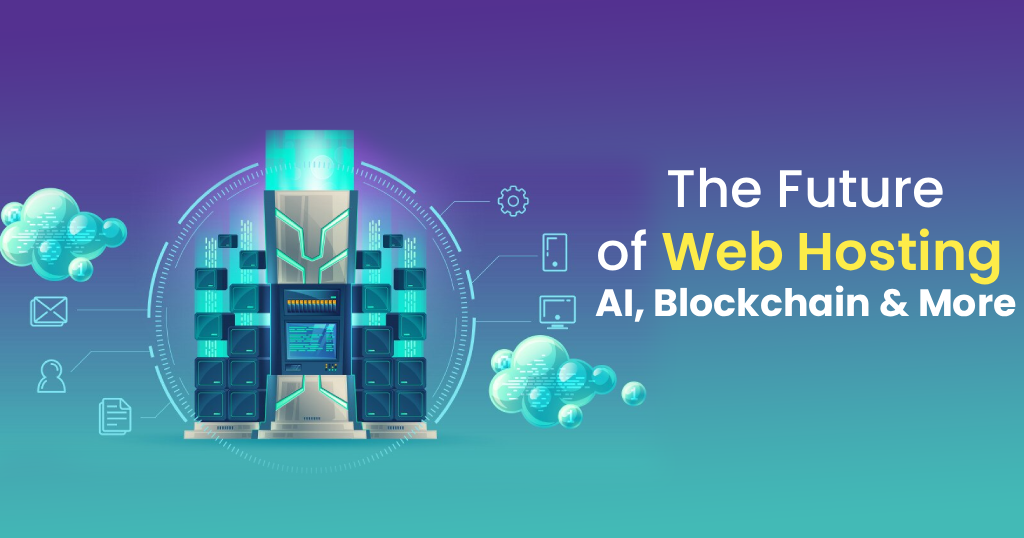Table of Contents
Today, web hosting is no longer a static service working behind the scenes. It’s becoming the stage where some of the most exciting tech transformations are playing out. Artificial intelligence is taking over routine operations, blockchain is rewriting the rules of trust and decentralization, and edge computing is turning the internet into a global, high-speed delivery machine.
This isn’t just about faster websites. It’s about a smarter, more secure, and radically reimagined internet infrastructure, and it’s already unfolding.
So, how will the future of web hosting be redefined using AI?
AI-Powered Hosting: Smarter, Faster, More Efficient

AI is turning traditional hosting on its head by replacing guesswork with intelligent automation and static infrastructure with self-optimizing systems. It’s like giving your server a brain that can think, adapt, and even predict the future
How AI is Changing Hosting:
- Predictive Resource Management
Forget manual upgrades or reactive scaling. AI algorithms analyze user behavior, traffic trends, and historical data to automatically allocate CPU, RAM, and bandwidth, often before you even know you need it.
Example: If your e-commerce store gets a sudden traffic spike from a viral post, AI can instantly boost your resources to keep everything running smoothly.
- Intelligent Security & Threat Detection
AI-driven firewalls and machine learning models can detect unusual activity in real-time blocking DDoS attacks, malware injections, or brute-force logins faster than traditional systems ever could.
Bonus: Some platforms even use AI to “learn” your website’s normal behavior and flag anything that deviates from the baseline.
- Smarter Server Optimization
AI can continuously fine-tune server configurations from caching strategies to database queries to ensure optimal performance based on actual usage patterns, not just default settings.
- AI-Powered Support & Automation
Hosting providers are integrating AI (like GPT-based systems) into customer support. This means quicker answers, smarter diagnostics, and fewer tickets stuck in the queue.
Fun fact: Some providers now offer self-healing servers where AI can fix basic issues without human intervention.
- Enhanced User Experience
AI isn’t just for backend optimization. It’s also powering personalized dashboards, smart recommendations (like best web hosting based on your site’s behavior), and guided setup wizards that make launching a site easier than ever.
If AI is the brain of future web hosting, blockchain is its backbone, creating a system that’s transparent, tamper-proof, and free from centralized control.
But what does Blockchain mean?

Blockchain is a special kind of database – like a digital notebook- where information is stored in blocks, and each block is linked to the one before it, forming a chain.
Think of blockchain as a Google Doc that many people can view and update, but once you write something, it’s locked in and can’t be deleted or edited. Every change is recorded, and everyone sees the same version.
Traditional web hosting, on the other hand, relies on centralized servers managed by a single company. That means a single point of failure, whether it’s downtime, data loss, or even censorship.
Blockchain Hosting: Decentralization for Security & Ownership:
Blockchain hosting flips the Traditional web hosting model completely. By distributing data across a decentralized network, blockchain-based hosting puts control back in the hands of users and removes the risks that come with centralized power.
Here’s how blockchain is reshaping hosting:
- Decentralization = No Single Point of Failure
Websites hosted on a blockchain are stored across multiple nodes around the world. If one node goes down, others step in, ensuring near-constant uptime and unmatched resilience.
- Smart Contracts for Automation
Smart contracts enable automatic and transparent agreements, whether you’re renewing a domain, allocating resources, or managing payments. No human middlemen. No hidden fees.
Use case: A decentralized website can auto-renew its hosting or domain names via a smart contract without requiring a credit card or customer service ticket
- Ownership & Privacy
In a blockchain-hosted environment, you own your data, not your hosting provider. That means fewer third parties touching your files, and more control over who sees what, and when.
Ideal for: Developers, publishers, and organizations concerned with censorship resistance, transparency, and digital sovereignty.
- Transparent Billing
With blockchain, every transaction is recorded on a public ledger. No surprise charges. No vague invoices. Just clear, verifiable usage and payments.
Ever clicked a button and waited just a little too long for something to load? That delay might be caused by the physical distance between your device and the server hosting the website. That’s exactly what edge computing aims to solve.
Edge Computing: Bringing Hosting Closer to the User

Instead of sending data back and forth to a central server (which could be halfway across the world), edge computing brings the power of good web hosting closer to the user, placing servers at the “edge” of the network, near cities and devices.
Why It Matters:
- Less Distance = Faster Speed
By hosting content closer to where your users actually are, edge computing drastically reduces latency and load times.
Example: A user in Cairo can access a website hosted on a nearby edge node instead of a server in Frankfurt cutting wait time significantly.
- Perfect for Real-Time Apps
Edge hosting is ideal for applications that need split-second responses like online gaming, video streaming, live chat, VR/AR, and real-time analytics.
Think of it as WordPress hosting with a turbocharger.
- More Resilience, Less Downtime
Edge networks are distributed, meaning if one server fails, others nearby can take over instantly. This redundancy improves reliability and uptime.
According to Gartner, by 2025, 75% of enterprise-generated data will be processed outside traditional data centers or clouds.
Sustainable Web Hosting: The Green Revolution
Every website, file, and email lives on physical servers, and those servers consume a lot of electricity, most of it coming from non-renewable sources. As digital demand skyrockets, so does the carbon footprint of data centers worldwide.
But that’s changing.
A growing wave of hosting providers and tech innovators is embracing sustainable web hosting, building greener infrastructure to power the web without powering climate change.
Here’s how the hosting industry is going green:
- Renewable Energy-Powered Data Centers
Many forward-thinking companies now run their servers on solar, wind, hydro, or a mix of clean energy sources, dramatically cutting emissions.
Example: Google Cloud and AWS have pledged to run entirely on carbon-free energy by the end of the decade.
- Smarter Cooling Systems
Cooling servers is one of the biggest energy expenses. Green hosting companies now use AI-driven climate controls, liquid cooling, and natural airflow designs to keep servers cool more efficiently.
- Carbon Offsetting Programs
Some providers invest in reforestation or carbon credit programs to offset their environmental footprint, even offering carbon-neutral hosting plans for eco-conscious customers.
- Energy-Efficient Hardware
Modern servers are being designed to use less power while handling more traffic, thanks to advancements in chip design, virtualization, and software optimization.
The internet is responsible for roughly 2-4% of global carbon emissions, about the same as the airline industry. As more of the world goes digital, green hosting isn’t just a trend, it’s a necessity.
Web hosting is moving beyond basic infrastructure. As AI, blockchain, and edge computing mature, they’re not just enhancing hosting, they’re redefining it.
At Thamara, we don’t just keep up with the future, we build for it.
Our hosting solutions like Lifetime server hosting are designed to embrace the technologies shaping tomorrow. Whether you’re launching your first site or scaling a global platform, we deliver performance, security, and innovation without compromise. AI-powered optimizations, secure infrastructure, and sustainable energy goals it’s all part of the experience.
Because hosting shouldn’t just work, it should lead.
FAQs
1. What’s the difference between traditional hosting and AI-powered hosting?
Traditional hosting relies on fixed configurations and manual monitoring. AI-powered hosting uses smart algorithms to optimize performance automatically, predict issues before they occur, and allocate resources based on real-time traffic patterns.
2. Can I host my website using blockchain technology?
Yes. Platforms like Filecoin, Sia, and Arweave offer decentralized web hosting solutions using blockchain. This allows you to host data without relying on a central server, improving security and resistance to censorship or downtime.
3. Is edge computing suitable for all types of websites?
Edge computing is especially beneficial for real-time applications like video streaming, gaming, or augmented reality. Simpler websites may not require edge infrastructure, but it can still improve speed and availability for global users.



